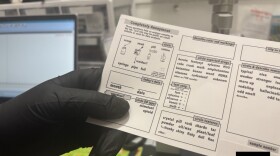Specifically, MSP looked into allegations that Cadillac’s Local Development Finance Authority (LDFA) violated Michigan’s Open Meeting Act by conducting business without the minimum number of members required, ignoring bylaws, and withholding meeting minutes and records.
What happened
Since the 1990s, the LDFA has overseen groundwater cleanup at Cadillac’s industrial park. Most of its funds come from about $150,000 in property tax revenue each year.
In recent years, Cadillac has been trying to deal with PFAS contamination in private wells and working to clean up the damage or shift those well owners to municipal water supplies.
This year it faced criticism for a lack of transparency, including from Cadillac resident Brad Marine, whose concerns center on the board’s decision to not test for PFAS back in 2021.
This happened after the Environmental Protection Agency asked for PFAS testing as a condition to close the existing, separate cleanup of the Cadillac Industrial Park.
“If they had done their due diligence,” Marine told IPR, “the public would have been aware of PFAS back when they were aware of it and the public would have said, ‘Hey, wait a minute. We need to test for this.’”
Marine says the board lacked a six-person quorum when they asked for a legal opinion on why the city would have to test for PFAS. In that same December 2020 meeting city manager and LDFA chair Marcus Peccia and another board member agreed to “fight being held accountable when it is not on our list of current tests.”
At their next meeting in February of 2021, the board then unanimously approved with quorum to send Barbieri’s legal letter to the EPA to forgo testing.
Marine told IPR he’s the one who lodged the complaint about the board with the Michigan State Police.
The investigation
IPR obtained police interviews with past LDFA board members, city manager Marcus Peccia, utilities manager Jeff Dietlin, and Marine.
You can read those MSP incident reports here by clicking on the report on the right.
What emerges from the interviews is an apparent sense of confusion and disorganization among some LDFA board members.
In an interview with MSP, current LDFA chairman Matthew Schichtel — who assumed the role at the beginning of 2025 — said he thought Peccia was able to spend $7,500 without board approval.
The report summarizes Schichtel’s interview as saying that, “deliberate or not,” running the board with vacancies and without quorum was “an easy way [for Peccia] to maintain control of operations” and do little work. Peccia was chair of the LDFA board until earlier this year and remains Cadillac’s city manager.
"If they had done their due diligence, the public would have been aware of PFAS back when they were aware of it and the public would have said, ‘Hey, wait a minute. We need to test for this.'"BRAD MARINE | Cadillac resident
Peccia was not available for comment, but Cadillac city attorney Michael Homier returned IPR’s call on his behalf.
The report also has Schichtel reiterating prior claims he made during previous board meetings that meeting minutes — which are required by law — were “clearly not published online for months and years prior.”
The missing meeting minutes have been a heated issue and have come up in LDFA board meetings repeatedly. The Cadillac News reported that after multiple requests for the minutes went unanswered, Schichtel said he was “prepared to escalate the issue to the Michigan Attorney General.”
In February, LDFA board members questioned Cadillac utilities manager Jeff Dietlin about his search for years of missing meeting minutes. At the time, Dietlin said he was reviewing files and records on his computer, but that they were corrupted.
When Dietlin spoke with MSP, he confirmed files were “corrupted but not deleted.” He further said, he “was able to produce paper records, scanned [sic] them, and made [sic] them available.”
Dietlin declined to speak with IPR, saying that he would consult legal counsel – also city attorney Homier.
“People construe the OMA as things don’t happen – like corruption of electronic files happens every day, right?” Homier told IPR. “So when those files get corrupted and you cannot retrieve them, does that mean that you violated OMA? The answer is no.”
In another interview with Michigan State Police, former LDFA vice chair and Wexford County Commissioner Michael Bush said during his tenure on the LDFA board from January 2022 to December 2024, he attended “zero meetings because he was never notified the time of the meetings nor ever received any responses to emails he sent out.”
When city manager Peccia was interviewed by state police, he said “he couldn’t confirm if (Bush) never attended a meeting, but stated it would be shocking if he never attended one meeting.”
Current board member and Wexford County Commissioner Julie Theobald was also interviewed by state police. She said she had been on the board for some time before she became aware of what a quorum was.
“What nobody knew at the time was this bylaw provision that said quorum was six members,” Homier said. “So while I agree that you know, the bylaws say what they say, that information either had become lost or unknown, certainly unknown to the present city administration and frankly, to the LDFA members as well.”
"In most cases, nobody sets out as a public servant to intentionally violate the OMA. Does it happen? Every darn day… but they're more technical or oversight violations."MICHAEL HOMIER | Cadillac city attorney
Once she understood that it was the minimum number of people needed to conduct official business, and that they didn’t have that, she said she “voted against going into closed sessions and would not participate in them.”
Despite this, she said quorum was not met on at least one occasion — August 29, 2024. The minutes show a closed meeting was held to allow for a “confidential and privileged legal opinion.”
The Open Meetings Handbook from the Michigan Attorney General’s Office says public bodies are allowed to go into closed session to talk with attorneys over trial or settlement strategies but only if having the conversation in public would cause financial harm.
They must happen in connection with an open meeting and any decisions must be made in open session.
They can also go into closed session to discuss “material exempt from discussion or disclosure by state or federal statute,” such as union negotiations or strategy surrounding a business deal.
What’s next
Phillip Ellison is an attorney whose practice focuses on government accountability. He said that while it’s rare that government officials are investigated criminally for violating the Open Meetings Act, “charges are almost nonexistent.”
What ends up happening more often, Ellison said, is that prosecutors direct cases toward civil lawsuits – as opposed to criminal charges. Individuals can then be sued in courts which can award up to $500 per OMA violation – a number that Ellison called “very insignificant.”
One of the reasons Ellison said the OMA is important is due to the fact that, by one study, Michigan ranks the lowest in the country for government transparency.
“One of the reasons why that is,” said Ellison, “is that we do not have well established, well crafted laws to compel transparency.”
In this circumstance, he said, the Open Meetings Act requires that the government generate the meeting minutes within a set time, but it has nothing in it about retaining meeting minutes once they're generated.
“The law here basically says you have to generate minutes within eight days of the meeting, and they have to be approved at the following meeting,” said Ellison. “Full stop. There's nothing about retention.”
The MSP interviews have been sent to the Wexford County Prosecutor’s office for review.
Wexford County Prosecuting Attorney Johanna C. Carey responded in an email to IPR that the matter was still under review and that she would not be making any comments at this time.
Cadillac’s city attorney is confident the officials did not intentionally violate the Michigan Open Meetings Act.
“But if the prosecutor determines something else," Homier told IPR, "I can guarantee you, we will vigorously defend against those charges.”








